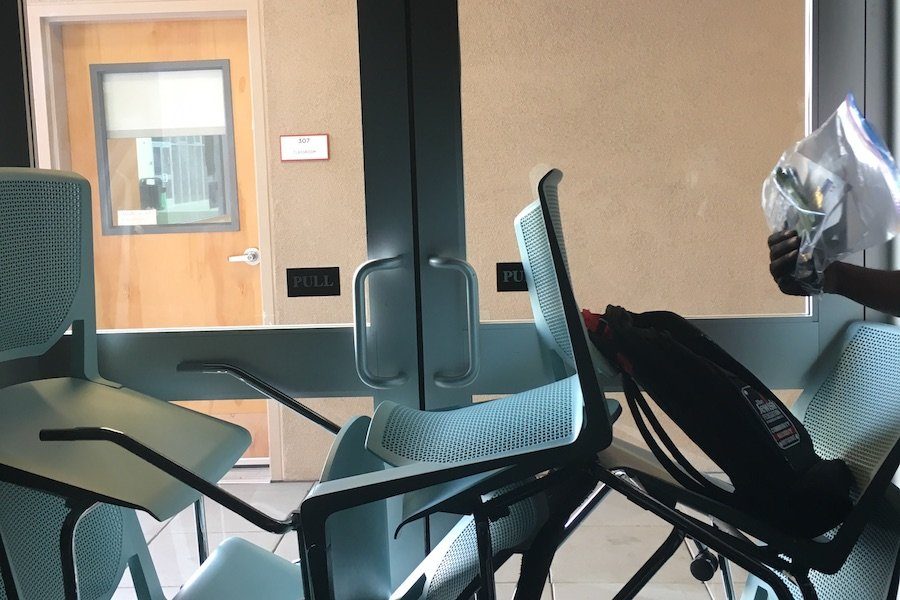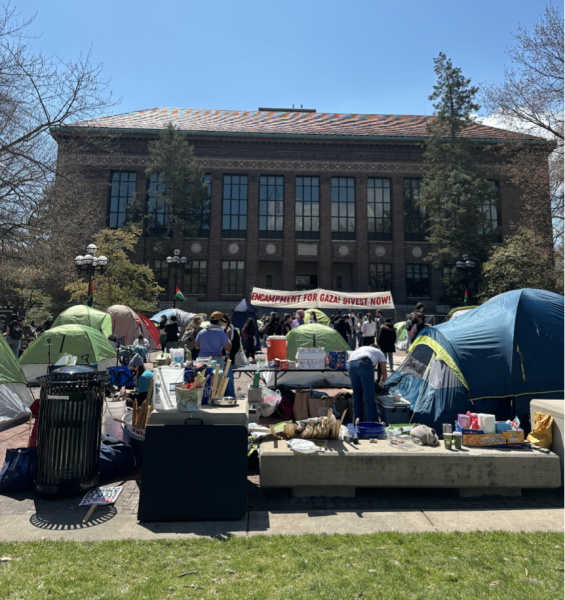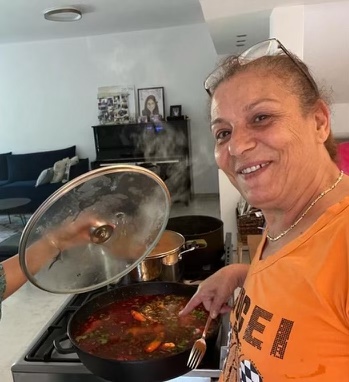Lights out, desks up and if possible, lock the door
Resourcefulness and some mystery at school’s first lockdown drill
BETTER: In an effort to secure a room without a lock, students in Mr. Smith’s English class barricaded glass doors with furniture.
With responses that ranged from barricading doors with furniture to continuing class as though nothing was happening, Shalhevet experienced its first-ever lockdown drill on Tuesday, March 20, five weeks after the shooting at Marjory Stoneman Douglas High School in Parkland, Fla., made students feel more vulnerable around the country.
Some classes turned off their lights, while others were unable to lock their doors. Some rooms have walls that are made entirely of glass, and students did their best to find cover. Classrooms on the third floor with double glass doors or glass walls felt particularly unsafe.
“It was kind of scary cause there was nothing to block you from bullets, and one of the blinds didn’t close so you could literally just see in,” said junior Dylan Corn, who was in room 303 at the time. “They could definitely shoot us really easily.”
The drill was a first for Shalhevet, though eight other schools contacted by the Boiling Point in February had all had lockdown drills in the past. At a security assembly right after the Parkland tragedy, officials called the campus among the safest and best protected in the state, thanks to armed guards, a heavy iron gate and other measures designed to keep intruders off campus and outside the building.
And despite the lack of uniformity during the lockdown exercise, school officials deemed it a success.
“No emergency is going to play out exactly like you scripted it,” said Executive Director Sarah Emerson an interview a few days later. “The lack of uniformity depending on what they did actually speaks to creativity and quick and fast thinking, and people come up with different solutions.”
The main purpose of this drill, Ms. Emerson said, was for the security team to discover which rooms needed additional equipment or instructions. In the meantime, “if there were problems in a classroom, they thought quickly on their feet,” she said.
“Not all actions have to be uniform, and that’s not what we’re looking for,” Ms. Emerson said. “We want [students and faculty] to react with safety in mind.”
She said officials conducted a “post-lockdown debrief,” including a faculty survey to ascertain the successes and failures of the school security situation.
“We’re going to be using those responses to figure out next steps in terms of both physical needs of the building and creating our next level of training for students and faculty,” Ms. Emerson said.
On March 20, the exercise began around 11 a.m. with a coded message, broadcast over the school intercom, instructing a “Mr. Jones” to go to the cafeteria.
Teachers knew this meant they should stage a lockdown in their classrooms, but students did not.
“The students were not told the code word in advance because that’s how our security team wanted to set up this drill,” said Ms. Emerson. She said in the future, students would be informed and receive guidelines on how to proceed.
Though she said this was meant to engender a sense of urgency, not recognizing the cryptic codeword left some feeling unprepared and potentially in danger.
“Our teacher told us what was happening but I didn’t know what was going on,” said Dylan. “I heard there was gonna be a drill, but who is this person [Mr. Jones] going downstairs?”
In their ignorance, students drew their own conclusions.
“We heard the ‘Mr. Jones’ thing and were like who is Mr. Jones?” said junior Donna Grunfeld. “We honestly thought that it was a new teacher, because we always have a new teacher.”
“None of us knew this was a lockdown drill — the doors don’t lock,” she continued. “The students should have been informed that it was going to happen. What happens if the teacher isn’t there? What happens if a student gets shot?”
But even without any preparation for the drill, other students felt somewhat safe in their own classrooms. Senior Elie Helfand was in Ms. Michelle Crincoli’s English class in Room 205.
“We felt we were pretty safe and quiet, but [the class next door] was so loud that it was actually insane,” said Elie, adding, “We had an inefficient way of locking the door. You had to open the door to lock it.”
Although Ms. Crincoli successfully locked the door, she said it would likely be more difficult in a real lockdown.
“I don’t know if that door thing would work if it was a real emergency and I was scared,” Ms. Crincoli said.
Some rooms did not have any locking mechanism, forcing some teachers to improvise, many using emergency backpacks that hang near the doorway.
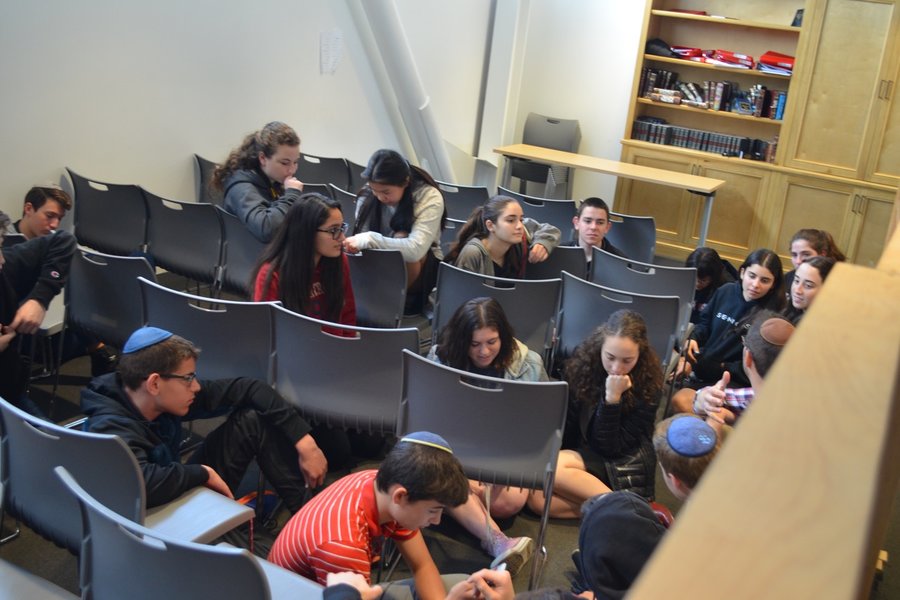
HIDING: Students crouched between chairs behind a mechitzah during Shalhevet’s first-ever lockdown drill March 20.
“I was in room 304 and it did not have the backpack to lock the doors from the inside,” said Rabbi Ari Schwarzberg.
“I put the siddur cart in from of the door, but I didn’t think that the doors open from the outside so it didn’t make a difference.”
Teachers in rooms with glass doors hastily barricaded them with furniture. One was Mr. Eric Smith, who was teaching in room 307.
“Mr. Smith started telling us to get up and go to the corner while he and a couple other guys stacked some chairs in front of the door and window,” said freshman Gaby Bentolila.
Students who were not in a classroom at the start of the drill had no way to know what was going on. Some teachers called them into their rooms, and some did not.
“I was walking in the hall and talking to a friend and then we heard the announcement [about ‘Mr. Jones’],” said senior Daniel Ornstein. “I didn’t think anything of it.
“[Science teacher Dr. Elizabeth] Basheer called us into her classroom and we were confused. I thought we were in trouble until she locked the door.”
Junior Daniel Medovoy was in the hallway getting his Hebrew book at the time of the drill.
“The lockdown drill started and Rabbi Stein ran out of the teachers lounge and told me to come in,” said Daniel. “They put me in the back of the room and they gave me Coca-Cola and it was fun.”
Although he enjoyed the experience, Daniel felt unaware throughout the process.
“I had no idea what was going on and I didn’t hear it that well, and I only realized that there was a lockdown drill when Rabbi Stein came out.”
The administration and security team had told students a drill was coming, though not when, at a the security assembly.
Ms. Emerson said the administration plans to conduct more and will continue to refine its security protocols.
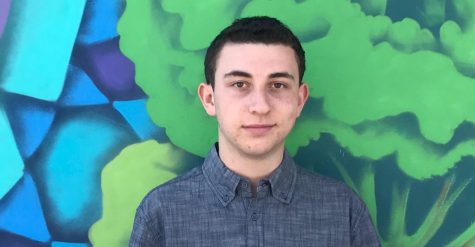
Tyler has been working for the Boiling Point for two years, and is currently the Editor of Outside News. When he isn't writing a story or editing a Table Talk, you can probably find him in the robotics lab.

